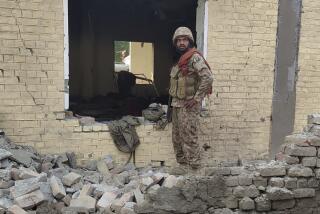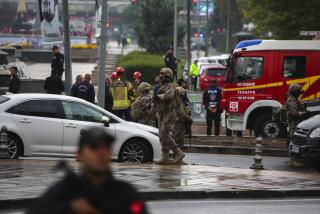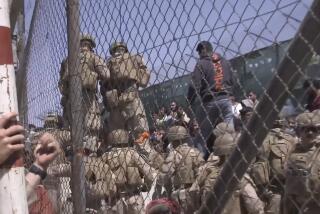Suicide Blast at Afghan Interior Ministry Kills 12
- Share via
KABUL, Afghanistan — A suicide bomber strapped with explosives detonated in front of the Afghan Interior Ministry as staffers arrived for work today, killing at least 12 people and wounding 42.
The bomber blew up in a crowd of people passing through a security gate on a narrow dirt road just before 8 a.m. Emarai Basheri, an Interior Ministry spokesman, blamed the attack on “the enemies of the nation and peace in Afghanistan.”
The Interior Ministry is in charge of Afghanistan’s police, including units responsible for counter-terrorism and counter-narcotics operations.
Mohammed Saddiq, a local photographer, was taking pictures of a customer near the ministry when police started shouting and ran toward a person in the crowd.
“As soon as the Interior Ministry officers got close to him, he exploded,” Saddiq said. “There was flesh and blood and bones of people all around the area. A lot of people have been killed.”
Suicide bombers, once rare in Afghanistan, have carried out at least 50 attacks this year in the worst wave of insurgent violence since U.S.-led forces toppled the Taliban regime five years ago.
This month, the U.S. military said a suicide cell in Kabul, the Afghan capital, was targeting American and other international troops. The warning followed a suicide car bombing near the U.S. Embassy, which killed two American soldiers and 14 Afghan civilians. That was the worst such attack in Kabul since the fall of the Taliban.
Insurgent attacks began to surge early this year as the North Atlantic Treaty Organization gradually took over more responsibility for security in southern Afghanistan from U.S. forces. NATO is in now command of military operations in the south, where Taliban and allied fighters have fought fierce battles in recent weeks.
The alliance says it doesn’t have enough troops in Afghanistan to fight insurgents, who have surprised commanders with their tenacity. NATO has asked its members, which include the U.S., to send an additional 2,500 soldiers, but so far, European nations have failed to meet that request.
NATO announced this week that it would soon assume command from U.S. forces in eastern Afghanistan, where insurgent attacks are also on the rise following a treaty between Pakistan’s government and Pashtun tribesmen in North Waziristan, on the Afghan border.
Under the treaty, the tribes are supposed to expel foreign fighters and end attacks in Afghanistan in exchange for a reduction in Pakistani security forces in the largely autonomous tribal areas.
During a recent visit to the U.S., Pakistani President Pervez Musharraf defended the treaty, arguing that it was the best solution, but Afghan and U.S. officials doubt it will prevent Taliban and allied militants from moving into Afghanistan.
Musharraf contends that Afghan President Hamid Karzai is to blame for the rising violence, which the Pakistani president calls a “popular uprising” by Pashtuns, Afghanistan’s largest ethnic group, from which the Taliban were born.
Special correspondent Wesal Zaman in Kabul contributed to this report.
More to Read
Sign up for Essential California
The most important California stories and recommendations in your inbox every morning.
You may occasionally receive promotional content from the Los Angeles Times.










